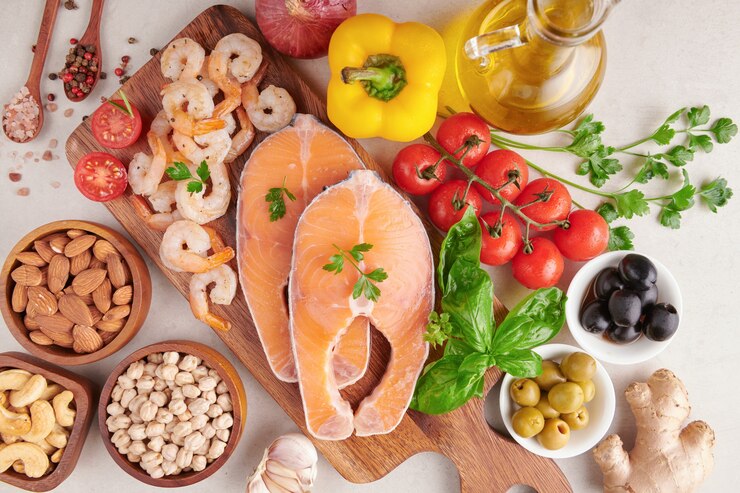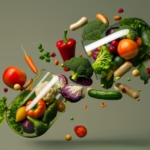Best Vitamins : In today’s world, staying healthy is more important than ever. With the constant threat of viruses and bacteria, it’s essential to keep our immune system strong and resilient. One way to do this is by ensuring we get the right vitamins and nutrients in our diet. In this article, we’ll explore the best vitamins that can help bolster your immune system and keep you healthy.
Chapter 1: The Importance of a Strong
Immune System Your immune system is your body’s defense against germs and pathogens. It’s like having an army inside you that fights off invaders to keep you healthy. A strong immune system can help prevent illnesses like colds, flu, and even more serious infections.
Chapter 2: Vitamin C

Vitamin C is perhaps the most well-known vitamin for its immune-boosting properties. It’s a powerful antioxidant that helps protect cells from damage and supports the immune system. Foods rich in vitamin C include citrus fruits, strawberries, bell peppers, and broccoli.
Chapter 3: Vitamin D
Vitamin D is essential for a healthy immune system, yet many people don’t get enough of it. It helps regulate the immune response and can reduce the risk of respiratory infections. You can get vitamin D from sunlight, fatty fish like salmon, fortified dairy products, and supplements.
Chapter 4: Vitamin E
Vitamin E is another important antioxidant that plays a role in immune function. It helps protect cells from damage and supports the production of immune cells. Foods rich in vitamin E include nuts, seeds, spinach, and avocados.
Chapter 5: Vitamin A
Vitamin A is crucial for maintaining the integrity of the skin and mucous membranes, which are the body’s first line of defense against pathogens. It also supports the production of white blood cells, which are essential for fighting infections. Foods rich in vitamin A include carrots, sweet potatoes, spinach, and liver.
Chapter 6: Vitamin B6

Vitamin B6 is involved in several aspects of immune function, including the production of antibodies and the maintenance of healthy skin. It also plays a role in the formation of red blood cells, which carry oxygen throughout the body. Foods rich in vitamin B6 include poultry, fish, bananas, and chickpeas.
Chapter 7: Zinc
Zinc is a mineral that’s essential for immune function. It helps activate certain enzymes that are involved in the immune response and supports the production of white blood cells. Foods rich in zinc include oysters, beef, pumpkin seeds, and lentils.
Chapter 8: Iron
Iron is important for immune function because it helps carry oxygen to cells and supports the production of white blood cells. Iron deficiency can weaken the immune system and make you more susceptible to infections. Foods rich in iron include red meat, poultry, lentils, and spinach.
Chapter 9: Selenium
Selenium is a mineral that’s important for the production of antioxidants, which help protect cells from damage. It also plays a role in the immune response and can help reduce inflammation. Foods rich in selenium include Brazil nuts, tuna, eggs, and sunflower seeds.
Chapter 10: Probiotics
While not a vitamin or mineral, probiotics are beneficial bacteria that support a healthy immune system. They help maintain a balance of good bacteria in the gut, which is important for immune function. Probiotic-rich foods include yogurt, kefir, sauerkraut, and kimchi.
Conclusion
A strong immune system is essential for staying healthy and fighting off infections. By ensuring you get the right vitamins and nutrients in your diet, you can help bolster your immune system and keep yourself feeling your best. Incorporate a variety of vitamin-rich foods into your diet, and consider taking supplements if you’re not getting enough nutrients from food alone. With the right approach, you can support your immune system and stay healthy year-round.
Also Refer : Easy Stretches To Help Your Body And Mind Relax
FAQs
What are the best sources of vitamin C for boosting the immune system?
Some of the best sources of vitamin C include citrus fruits like oranges and grapefruits, strawberries, bell peppers, broccoli, and kiwi.
How much sunlight exposure do I need to get enough vitamin D?
The amount of sunlight exposure needed varies depending on factors like skin type, time of day, and geographic location. Generally, spending about 10-30 minutes in the sun without sunscreen a few times a week can help your body produce enough vitamin D.
Can I get enough vitamin D from food alone?
While some foods like fatty fish, fortified dairy products, and fortified cereals contain vitamin D, it can be challenging to get enough from food alone. Taking a vitamin D supplement may be necessary, especially for those who have limited sun exposure or dietary restrictions.
Are there any risks associated with taking vitamin supplements?
While vitamins are generally safe when taken as directed, taking high doses of certain vitamins can lead to adverse effects. It’s important to follow the recommended dosage guidelines and consult with a healthcare professional before starting any new supplement regimen, especially if you have underlying health conditions or are taking medications.
Can probiotics really boost my immune system?
Probiotics are beneficial bacteria that support a healthy gut, which is linked to a strong immune system. While more research is needed, some studies suggest that probiotics may help reduce the risk of certain infections and support overall immune function. Incorporating probiotic-rich foods into your diet, like yogurt and fermented vegetables, can be a good way to promote a healthy gut and potentially boost your immune system.





